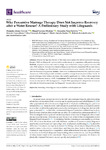Mostrar o rexistro simple do ítem
Why Percussive Massage Therapy Does Not Improve Recovery after a Water Rescue? A Preliminary Study with Lifeguards
| dc.contributor.author | Alonso-Calvete, Alejandra | |
| dc.contributor.author | Lorenzo-Martínez, Miguel | |
| dc.contributor.author | Pérez-Ferreirós, Alexandra | |
| dc.contributor.author | Couso-Bruno, Antonio | |
| dc.contributor.author | Carracedo-Rodríguez, Eloy | |
| dc.contributor.author | Barcala-Furelos, Martín | |
| dc.contributor.author | Barcala-Furelos, Roberto | |
| dc.contributor.author | Padrón Cabo, Alexis | |
| dc.date.accessioned | 2022-06-29T16:35:04Z | |
| dc.date.available | 2022-06-29T16:35:04Z | |
| dc.date.issued | 2022-04-07 | |
| dc.identifier.citation | Alonso-Calvete, A.; Lorenzo-Martínez, M.; Pérez-Ferreirós, A.; Couso-Bruno, A.; Carracedo-Rodríguez, E.; Barcala-Furelos, M.; Barcala-Furelos, R.; Padrón-Cabo, A. Why Percussive Massage Therapy Does Not Improve Recovery after aWater Rescue? A Preliminary Study with Lifeguards. Healthcare 2022, 10, 693. https://doi.org/10.3390/healthcare10040693 | es_ES |
| dc.identifier.issn | 2227-9032 | |
| dc.identifier.uri | http://hdl.handle.net/2183/31036 | |
| dc.description.abstract | [Abstract] The aim of this study was to analyze the effects of percussive massage therapy (PMT) on lifeguards’ recovery after a water rescue, in comparison with passive recovery. Methods: A quasi-experimental crossover design was conducted to compare passive recovery (PR) and a PMT protocol. A total of 14 volunteer lifeguards performed a simulated 100 m water rescue and perceived fatigue and blood lactate were measured as recovery variables after the rescue and after the 8-min recovery process. Results: There were no differences between PMT and PR in lactate clearance (p > 0.05), finding in both modalities a small but not significant decrease in blood lactate. In perceived fatigue, both methods decreased this variable significantly (p < 0.001), with no significant differences between them (p > 0.05). Conclusions: PMT does not enhance recovery after a water rescue, in comparison with staying passive. Despite PMT appearing to be adequate for recovery in other efforts, it is not recommended for lifeguards’ recovery after a water rescue. | es_ES |
| dc.language.iso | eng | es_ES |
| dc.publisher | MDPI AG | es_ES |
| dc.relation.uri | https://doi.org/10.3390/healthcare10040693 | |
| dc.rights | Atribución 4.0 Internacional | es_ES |
| dc.rights.uri | http://creativecommons.org/licenses/by/4.0/ | * |
| dc.subject | Afogamento | es_ES |
| dc.subject | Salvamento | es_ES |
| dc.subject | Modalidades de recuperación | es_ES |
| dc.subject | Atención extrahopitalaria | es_ES |
| dc.subject | Ahogamiento | es_ES |
| dc.subject | Drowning | es_ES |
| dc.subject | Lifesaving | es_ES |
| dc.subject | Recovery modalities | es_ES |
| dc.subject | Extra-hospital care | es_ES |
| dc.title | Why Percussive Massage Therapy Does Not Improve Recovery after a Water Rescue? A Preliminary Study with Lifeguards | es_ES |
| dc.type | info:eu-repo/semantics/article | es_ES |
| dc.rights.access | info:eu-repo/semantics/openAccess | es_ES |
| UDC.journalTitle | Healthcare | es_ES |
| UDC.volume | 10 | es_ES |
| UDC.issue | 4 | es_ES |
| dc.identifier.doi | 10.3390/healthcare10040693 |
Ficheiros no ítem
Este ítem aparece na(s) seguinte(s) colección(s)
-
GI-PHG - Artigos [118]






